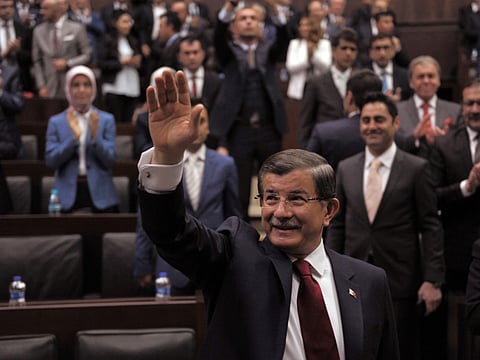Turkey PM steps down due to ‘Erdogan pressure’
Ruling AK Party will hold leadership contest in 15 days and Davutoglu will not be a candidate

Ankara: Turkish Prime Minister Ahmet Davutoglu announced his resignation on Thursday, paving the way for the country's president to pursue a tighter trip on power.
"I decided that for the unity of the (ruling party) a change of chairman would be more appropriate. I am not considering running at the May 22 congress," Davutoglu told the nation.
Davutoglu, who had fallen out with President Recept Tayyip Erdogan, announced he was stepping aside following a meeting with executives of the ruling Justice and Development Party, or AKP, which has dominated Turkish politics since 2002.
The decision is not effective immediately.
The party will hold an emergency convention May 22 to select a new party leader who would also replace the premier.
Davutoglu said he would not run.
Davutoglu lost a power struggle with President Recep Tayyip Erdogan that’s sent financial markets plunging.
The two leaders held a late-night summit on Wednesday, and neither issued an official statement after it finished.
A person familiar with the matter said Davutoglu’s AK Party will hold a leadership contest within about 15 days – and the premier won’t be a candidate.
The person asked not to be identified because the decisions haven’t been made public. Turkey’s lira slid as much as 4.5 per cent, its biggest decline since 2008.
Erdogan ran Turkey for more than a decade as prime minister and has maintained his tight grip on power even after moving up in 2014 to the presidency, traditionally a largely ceremonial office.
Davutoglu, his handpicked successor, has struggled to assert his own authority.
Clashes
Increasingly frequent clashes between the two men have undermined confidence in Turkey’s $720 billion (Dh2.64 trillion) economy at a time when investors also are concerned about an escalating conflict with Kurdish rebels and attacks by Daesh terrorists.
“Erdogan continues to be the primary actor in Turkish politics,” said Steven Cook, a senior fellow for Middle East and Africa studies at the Council on Foreign Relations. He “wanted a pliant prime minister and Davutoglu had ambitions to be his own man, but Davutoglu did not have a power base in the party”.
Davutoglu was to hold a press briefing after meeting senior party officials at 11am local time on Thursday, the state-run Anadolu Agency said. During the news conference, he’s expected to announce his decision to take the party to an extraordinary convention, according to the person familiar with the matter. CNN-Turk also reported the prime minister’s plan.
In advance of the meeting, Davutoglu was planning to tell Erdogan that he needed to respect the premier’s office and let him get on with the job or he would call an emergency party convention, according to the person. The outcome suggests the two men failed to bridge their widening rift.
Wednesday’s showdown comes less than a week after the ruling party board stripped the premier of the power to name local branch heads. That move was orchestrated by Davutoglu’s rivals in the party’s management while he was in Qatar for an official visit, the person said.
On Tuesday, the usually soft-spoken premier angrily told AKP parliamentarians that he would reject, “with the back of my hand any job that a mortal would not think of leaving”.
Without naming names, Erdogan said in a Wednesday speech at his palace in Ankara that “what’s important is to not forget how you came to where you are, what you need to do there and what your targets are.”
People close to the two leaders have spoken of an unsustainable split in policy making, with areas of disagreement that include managing the economy. Davutoglu and his allies have argued for more orthodox economic policies, an agenda that Erdogan and those who back him blame for high interest rates and slowing growth, according to the person who commented on Davutoglu’s thinking.
Rifts between the leaders emerged shortly after Davutoglu took office in 2014. The first major public policy split came when Davutoglu proposed a “transparency package” aimed at tackling corruption. Erdogan, who quashed a corruption probe while he was prime minister, said the measure was premature and it was withdrawn in February 2015.
Erdogan also scoffed when Davutoglu presented as a diplomatic victory his success in persuading the European Union to move up to June its timetable for waiving visas for Turkish citizens. Erdogan said the original agreement had been reached when he was prime minister and no one should present a four-month change in the schedule as a political victory.
“The credibility of Turkey’s EU road rests today with Prime Minister Ahmet Davutoglu,” Carl Bildt, formerly Sweden’s prime minister and a champion of Turkey’s bid to join the European Union, said on Twitter. “If he leaves, bets are off.”
The lira slid as much as 4.5 per cent on Wednesday against the dollar and closed the day 4 per cent lower. On Thursday, it gained slightly and was trading at 2.9392 per dollar at 8.05am in Istanbul.
Sign up for the Daily Briefing
Get the latest news and updates straight to your inbox



